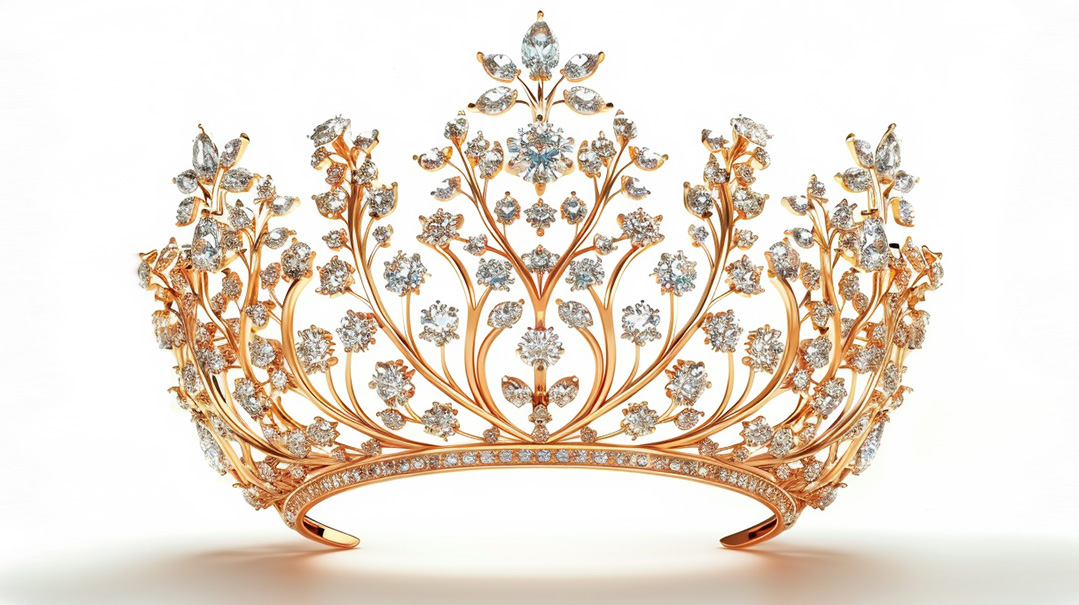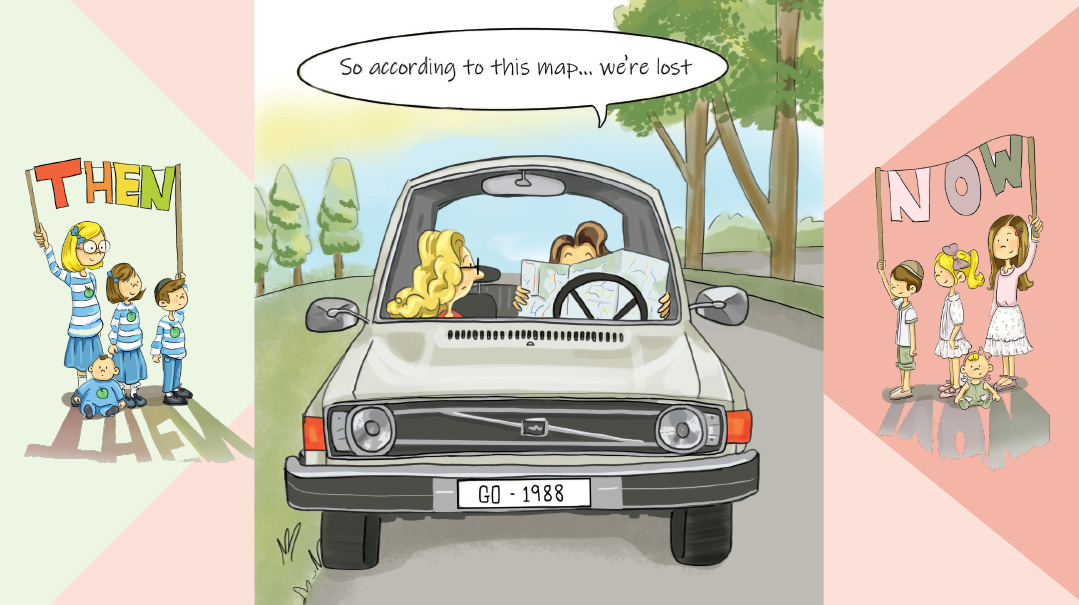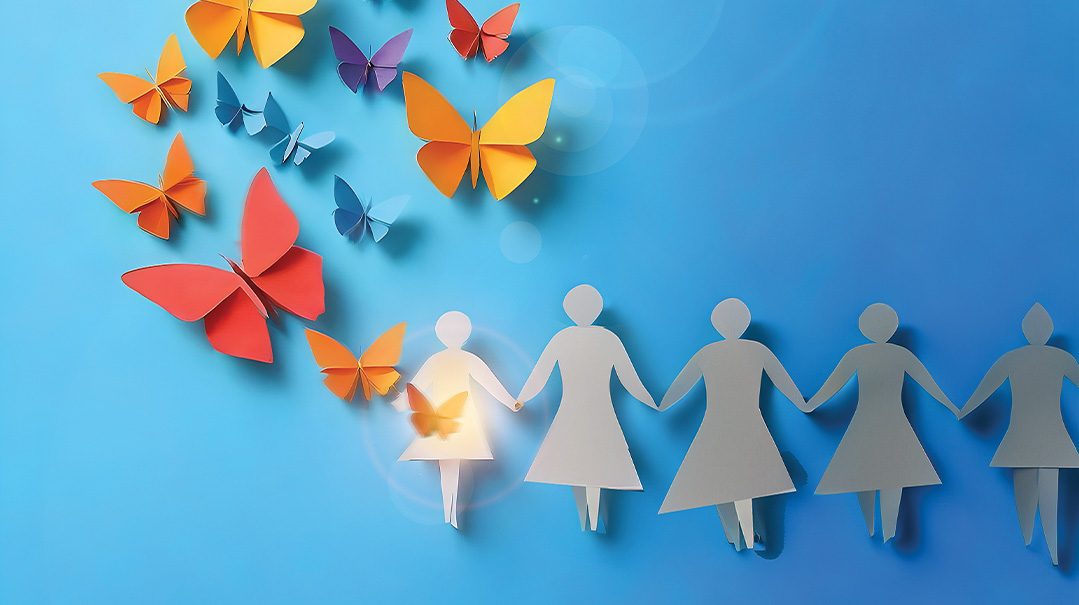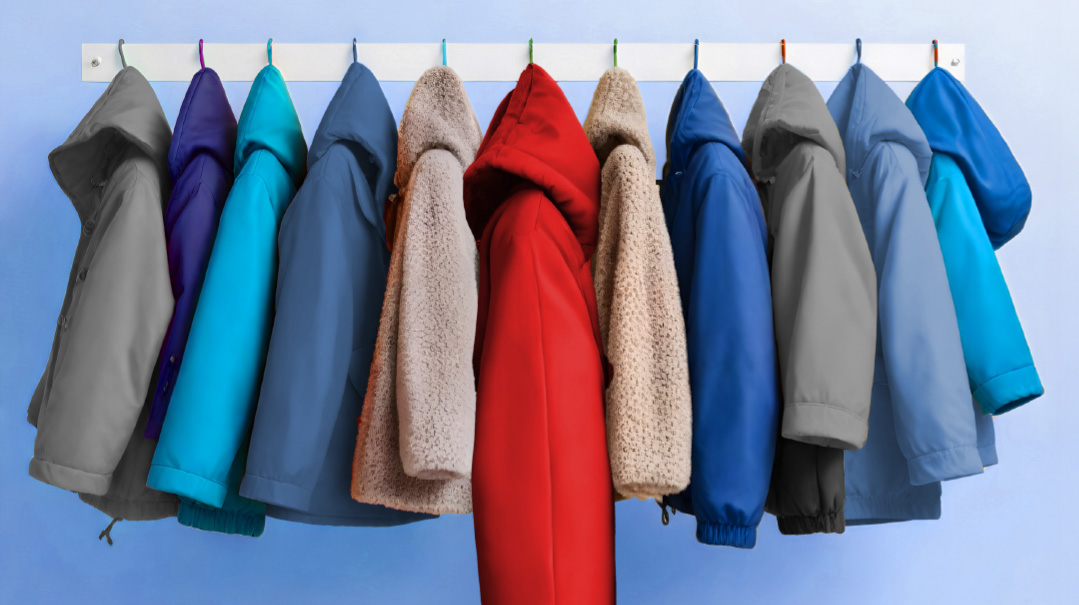Smoke and Mirrors
| December 9, 2020Does the mirror reveal the truth of our worth — or expose ideals built on lies?

Five More Pounds
Faigy Spector
The second thing my mother said after she visited me post-birth was, “Five pounds this birth, five pounds next one, and before you know it, none of your clothing will fit.”
This was her mantra as long as I can remember: “Yes, she looks beautiful in her wedding gown, but just another five pounds…” “The secret is to weigh yourself every week and catch it before it gets to five pounds…” All of your life, every meal you eat, every time you join a simchah, you are teetering at the edge of a precipice. Just five more pounds and you will no longer measure up, no longer be worthy.
I remember one time when I made the grade, dressed up for a simchah. My mother arrived, took a look, and said, “Wow, you look like you’re a size six!” Her tone implied that I had reached the pinnacle of feminine achievement.
I fought the good womanly fight for many years, but at some point the usual tactics stopped working. I am long past “just another five pounds.” I will never again be a size six (and never a size eight, either).
Really, it shouldn’t matter. Decades after my wedding, I don’t need my sheva brachos clothing to fit. (Women don’t wear suits these days anyway.) I’m a very normal size for a woman my age and stage, and with the right clothing and grooming I can look — well, maybe not skinny, but still good.
More than that, I know what really matters and I’ve been very blessed. I have a wonderful husband and a beautiful family. I belong to a low-key, nonjudgmental community and am a valued employee with an influential position.
But something inside me still feels less worthy, less successful, less deserving, because I can’t figure out how to get back to those ideal proportions. (Believe me, I’ve tried endless, tortured attempts to find the right diet, cut out the wrong foods, and perfect the ideal exercise plan to finally get back to my thinner self.)
Something ugly inside of me still twists in pain when I consider all those women who can just wear whatever’s in the store window without worrying what parts of them stick out too much, who can just walk into a room with easy confidence, who don’t agonize over photo sessions or weddings or new, unflattering clothing styles.
It’s so easy to pin this all on my mother (she’d probably pin it back on her mother), but I’m a big girl now, and at this point the voice is my own. It makes no sense, but this is not about logic.
I know it’s shallow, I know it’s silly, I know it’s destructive, but I can’t figure out how to shut off this voice that keeps linking my worth to my weight, keeps me convinced that more makes me less.
Life Recovered
Chani Lerner
My story is not that much different from anyone else’s.
It started innocently enough. It was just a diet — less sugar, more exercise. Like every other teenager, I wanted to be thinner. Pretty straightforward. Until it wasn’t.
I quickly spiraled from healthy eating to not eating at all. If the goal was to be thin, why drag out the process? Science says that a caloric deficit causes weight loss, and my logic was, the larger the deficit, the faster the weight loss.
I should have won. I should have lost the weight and been satisfied, but science failed. I lost some weight initially, but it was never enough. I started engaging in risky behaviors to reduce my weight even more. Eventually my metabolism called it quits.
I felt like a failure. Here I was, eating an amount that wouldn’t sustain a toddler, and yet I couldn’t reach The Ideal Weight.
As time went on, my secret caught up with me. My balance started to fail, I was cold all of the time, and I became extremely withdrawn. I spent the majority of the day caught up in my own head, engaging with the bully who resided there.
I’d wake up in the morning with the sole purpose of getting through the day without eating too much. I stopped joining in social activities, I couldn’t focus in school, and every interaction at home was filled with tension. I stopped talking, stopped sleeping. I couldn’t let anyone interrupt me. If I only lost a few more pounds, then I’d be able to relax. I’d fit in. I’d be okay.
I ended up being hospitalized at the age of 18 and started on the process of refeeding. Learning to eat again was draining, and several times I felt like giving up. Watching my body change rapidly was a hellish experience. I was embarrassed to be seen outside and did everything I could to hide my body.
Unfortunately, because I hadn’t done the emotional work required to heal from an eating disorder, the first hospitalization wasn’t enough to bring about my recovery. It was a series of ups and downs from there until I was able to take recovery into my own hands, join another program, and give it my all.
The treatment center was a safe haven for me. I was in a protective, carefully controlled environment. In that setting, I was able to slowly begin to trust that my body was not out to get me. I needed to start believing that my weight wasn’t the only thing that defined me. I had to untangle my worth from my weight. I started to focus on accomplishing other goals, and slowly the burning need to become smaller and smaller started to fade.
Today, I’m six years into the grueling process of recovery. Thank G-d, with lots of hard work and an incredibly patient team, I can finally say that I’m nearing the finish line.
Looking back, I don’t blame society for giving me an eating disorder. At this point, I can recognize that this was a struggle that G-d alone placed before me. But I do struggle to accept the way our community engages with weight and body image.
When I was freshly discharged from treatment and still in my recovery bubble, each time I heard another body-shaming/diet-promoting comment, I’d start to doubt my choice to recover all over again. In our society, body shaming, calorie counting, and dieting are considered normative. We, as a collective society, buy into the myth that all women should look alike, eat the same food, and wear the same (small) size clothing.
I’m working hard to free myself from that need to fit in. I no longer want to be shackled to a life where I’ll only feel okay if I’m wearing a baggy size zero. I was put in this world to work on and perfect my character. I don’t want to waste that time on a never-ending quest for the perfect body.
Accept Your Ideal
Dina Cohen
You don’t get to choose your healthy weight. People always ask, “What should I eat to get to my ideal weight?” But that’s looking at it backwards. Your ideal weight is the one you’re at when you’re eating reasonably well and being reasonably active.
This weight may not be what society thinks is ideal, but it’s what is ideal for your body. There is no diet or exercise plan on which you can choose your body, because your body has already been chosen for you. This can be hard to accept — our culture does a very good job of telling us that bodies are malleable and that changing them is just a matter of willpower. However, just like you have a genetically predetermined height and shoe size, you have a predetermined healthy weight range. Your weight may be influenced by your lifestyle, but attempts to manipulate your body’s natural size will probably not end well.
While it’s true that external factors can influence a person’s size (malnutrition can stunt a child’s growth and foot-binding can make feet smaller), it’s critical to understand that what is possible is different from what is healthy. Dieting may lead to a smaller body size (usually only temporarily), but that doesn’t mean it is healthy.
Maintaining a body size smaller than what is natural for you comes at a very high cost. Because bodies do not function well without enough nutrition, you will probably experience an assortment of psychological and physical side effects. We aren’t wired to be relaxed about not having enough food. Additionally, your body will fight to restore its ideal weight, which is very frustrating.
If you have to devote an excessive amount of time and energy to your eating and exercise in order to maintain a certain weight, this is a clue that you may be trying to achieve something unnatural for you. Since many of us lead sedentary lifestyles and have access to all sorts of foods, we may need to be conscious of our lifestyle choices. Nonetheless, maintaining a healthy weight should not be a full-time job. If it is, you may be trying to maintain a weight that isn’t right for you.
Does this mean that every weight is healthy for every person? Of course not. One major misconception about Health at Every Size is that it means everyone can be healthy at any size. That would be ridiculous.
Health at Every Size is an approach that encourages the pursuit of health rather than the pursuit of weight loss. It means determining your state of health by actually looking at your health instead of making judgments based on your weight. It puts the focus on what can actually be changed — your behaviors — rather than on something you cannot directly control — your weight.
If you’ve gained weight as a result of poor lifestyle choices, then you may lose weight by changing those behaviors. But the weight loss would be a side effect rather than the goal. Even if you don’t lose weight, improving your lifestyle choices can still lead to improved health and wellbeing. This is much more beneficial than dieting, which overwhelmingly leads to regaining the weight lost, if not more, and has a detrimental effect on health.
Dina Cohen, MS, RDN, CEDRD-S is a nutrition therapist who specializes in the treatment of eating disorders, chronic dieting, women’s health, and pediatric nutrition. She’s the founder of EatWellSoon, a nutrition counseling practice in Lakewood, New Jersey, dedicated to helping individuals and families develop lifelong healthy habits and a positive relationship with food.
Imperfectly Perfect
Rivki Rabinowitz
In seminary, we used to eat Crunchim cereal. It had 90 calories a serving — better than 300 calories, so we ate the entire box. Springtime had us speed walking from Har Nof to Emek Refaim. The goal was to shed what we considered excess weight; instead I think we shed the happy carelessness that is the hallmark of youth, replacing it with anxiety.
By summer, I was married — to a dusty elliptical. My commitment to obsessive cardio was all at once exhilarating and isolating. I ran miles, lifted weights, cycled, and within two months, I’d lost that “seminary bloat.” Along the way, I learned that reaching a fitness goal made me feel unstoppable, strong of body and mostly of mind. I chased down each milestone with frenetic meals, often devoid of nutritional value, eaten standing over the kitchen sink. These meals left me depleted, wondering why if I was so fit, I had nothing to physically show for it.
That elliptical was replaced by a husband, and I rejoiced in how my journey appeared to pause. About a year after our wedding, I had an emergency C-section. I remember how I reached to see if my hip bones had reappeared. I was still numb post-surgery, my firstborn in someone else’s hands.
For the next decade or so, I focused on improving my fitness, strengthening the fortitude of spirit and mind required to stay active. I began to eat in a way that fueled my fitness — unrefined carbs for a quick burst of energy before a long run, protein to restore my muscles after a workout. Some of these had grounding in scientific studies, others were social media bluffs.
Exercise continued to be my north star, and I was on fire, fueling myself like an athlete — energetic, lithe.
And then something shifted. I began to read more about kindness to myself. It confused me: Aren’t we here to push ourselves out of our comfort zone? How do I know if I’m being lazy, or if I’m “listening to my body” by choosing inactivity over motion? What would my movement look like if there were no physical outcome?
Gradually, my workouts became less extreme. My eating patterns became more human as I realized that I need to eat to feel good. Sometimes that looks like a nourishing salad, sometimes it’s cookies, sometimes, yes, it’s mindless. Each one serves a vital, human role.
I have to stay constantly vigilant in my mindfulness that this was a choice I made — a choice to value what my intuition wants, not what I think I need to want. I hold space for each version of myself, because at every one of those stages, I was exactly where I needed to be. I see the one who felt she needed to be the smallest in the room to find the right husband, and I empathize with her. I miss the energetic and obsessive athlete more often than I’d like to admit, because reaching those goals had me feeling alive, powerful, invincible.
Honestly, I have not fully internalized the rhetoric that states I should love myself because I am smart or kind or a good mother or funny. Instead, I tell myself, you are imperfect because you are human. And I am patient with who I am today: still, present, learning.
What’s Important
Shira Isenberg
You are important.
Your health is important.
You don’t have to be perfect — and you shouldn’t even try to be — but you are worth the effort it takes to follow a healthy lifestyle and maintain a healthy weight.
Obesity is unhealthy. Yes, it’s possible to be obese and metabolically healthy, but it’s rare. (About 5 percent of obese people have normal insulin sensitivity and no metabolic conditions, according to a 2019 Journal of Clinical Investigation report.) As a general rule, obesity increases risk of heart disease, high blood pressure, diabetes, stroke, and cancer, and it’s linked to mental health conditions like depression. Obesity can unfortunately take a toll on quality of life, too, disturbing sleep, straining joints, making activity harder.
The thing is, losing weight is also hard. And keeping it off is perhaps even harder. Which is why I like the expression, “It’s a marathon, not a sprint.” (Full disclosure: My husband, an endocrinologist, uses this phrase all the time to describe diabetes. But it’s equally applicable to pursuit of a healthy weight.)
It’s about the long haul, about what will ultimately help you make it over that finish line of lower health risk and of better quality of life. Emphasis on the “you.” Because what works for your best friend, your neighbor down the block, and even your twin sister, isn’t necessarily what’s best or healthiest for you.
That means keep your focus on you. Where are you holding? What are your individual weight goals? How can you improve your lifestyle? Specifically, what are the small steps that will take you in that direction? Modest weight loss goals of 5 to 10 percent truly can improve health risks; it’s not just a party line.
I’m a firm believer in setting up an environment that’s conducive to those changes, one that makes that healthy lifestyle easier to follow. If we can adjust our environment so that we see nourishing foods when we open the cabinets and fridge, so that activity is built into our day-to-day life, so that we’re modeling healthy choices for our children, and so that self-deprecating comments aren’t overtaking our conversations — we’re setting ourselves up for success.
Do yourself a favor and pay attention to your weight. You don’t have to step on the scale, but you do need some way to track where you’re holding, so you’ll notice if you’re on an upward trend. See your physician regularly, and yes, exercise. Being active — fighting that sedentariness that’s synonymous with modern life — is a prerequisite for healthy living. Any activity counts.
Finally, be kind to yourself. Give yourself the pep talk, the encouragement, the love you’d show your best friend. You deserve it.
Shira Isenberg, RD, MPH, is a registered dietitian and writer with a Masters in Public Health (and a minor in Laundry). She lives in Memphis with her family.
Skeletal Isn’t Beautiful
Raizy Jotkowitz
I was always naturally on the thin side. But never skin and bones like I am now, even after going through a number of pregnancies.
That’s because not long after the birth of my second child, I was diagnosed with a serious digestive disease. Baruch Hashem, I’m in remission now, and have been for many years already. But there was a time when… I’ll spare you the gory details, but I was very unwell.
Nothing I consumed stayed in my body for long enough to absorb much of its nutrients, let alone for it to turn into fat; I often couldn’t leave my house because of digestive distress; and I had zero physical energy.
At one point, I weighed a mere 90 pounds (41 kilograms), and I’m average height. But I can’t tell you how many compliments I got, along the lines of, “Wow, you got so skinny. You look fabulous.”
I look back at pictures from a family simchah at the time, and I’m shocked by my appearance. I didn’t look good; I looked horrendous. My head seems too big for my body, and even under layers of makeup, my skin is tinged green.
Whenever I flip through that photo album, I always think, There’s something seriously wrong with our society’s perception of physical attractiveness if they think a skeletal, ill-looking body is beautiful.
Diets Don’t Work
Rachel Tuchman
We live in a society that perpetuates “diet culture” and constantly bombards us with messages that thinner is better. It’s healthier. It’s more beautiful, more successful, and happier. After you lose 20 pounds, you’ll feel better, get married, land that job.
The $72 billion diet industry feeds off our insecurities and fears, claiming that if we lose weight, we’ll live longer and have enhanced quality of life. Diet advertisements are full of happy, beautiful, thin people.
The truth: Diets don’t work. In over 40 years of evidence-based research, not a single study has ever concluded that diets produce long term weight loss in more than two percent of dieters. In other words, 98 percent of dieters cannot sustain their weight loss. In fact, research shows that the mere act of dieting increases dieters’ weight.
Dieting also negatively impacts your health. Starting a diet increases risk for weight cycling (yo-yo dieting), which has been shown to have even more adverse effects on health than being at a higher weight. Not only do diets not improve your health, they are linked to anxiety, depression, suicidal behavior, body image issues, and the development of eating disorders, which have the highest mortality rate of any mental health disorder and affect men, women, and children.
Think about it: How many diets have you been on in your life so far? Why didn’t they work? The diet will make you believe it was your failing, but the science shows us that our body knows exactly what it needs in order to function optimally, and it will fight back against attempts to restrict and shrink it. Contrary to popular belief, it’s mostly genetics, environment, and your daily habits that determine your health — not your weight.
Health is so much more than how you look and what you eat. Do you live in a safe neighborhood? Do you have financial stability? Are you happy in your job? Do you live with safe and loving people? Do you have access to quality, unbiased medical care? Are you connected to community? These things have a greater impact on your health than your body size.
Can you shift your focus from weight to health? Why not focus on implementing behaviors that have been proven to improve health regardless of weight? Engaging in physical activity that makes you feel good (any kind of movement is great!), increasing intake of fruits and vegetables, stopping smoking, limiting alcohol intake, improving sleep habits, and reducing stress have all been shown to have a greater positive impact on health and life expectancy than weight loss. Health is available to you at any size. Change your focus from trying to make yourself smaller. Instead focus on giving yourself the respect and care that you deserve.
Rachel Tuchman is a licensed mental health counselor based in Cedarhurst, New York, with over ten years of experience. Rachel is HAES (Health At Every Size) aligned clinician who promotes the importance of body respect and behaviors that honor our health. She also treats kids and teens; adults; women experiencing infertility, pregnancy loss, and post-hysterectomy; and is available for speaking engagements.
Work in Progress
Miri Stein
I had my first taste of a real diet at around 12, when, despite my natural propensity for making healthy food choices, I went to a dietician for weekly weigh-ins. I’d like to blame that first low-carb eating plan for ruining my metabolism forevermore, but I think that would be overly generous.
What it did do was firmly set in my mind that if I wasn’t on a diet, I was bad. If I was on a diet, I was good, in control, a model of maturity and self-discipline. I was vaguely aware of girls who were not on diets and somehow looked beautiful despite their indulgences, but I knew that couldn’t be me.
Despite my hard work, the weight stayed on. I was healthy and happy and social, but not skinny.
I got married (to my happy surprise; I feared my size would mean the thinner girls would get picked first and I’d be left firmly on the shelf). I had babies, gained weight and lost weight, joined gyms and quit gyms. I tried new fads, I read new research. I embarked down the old tried-and-true paths that had worked in the past, but suddenly were no longer effective.
Looking back, I’m ashamed to say there were times I looked sadly around me at the utter and unconditional good in my life, and said to myself. “If only I were thin, things would be perfect.”
I was healthy and happy and social, but not skinny, and it bothered me so much.
Finally, I reached a tipping point. I wished I could say it was rock bottom, but it was rock top, as far as weight was concerned. I’d been restricting my daily food intake to a point I knew was unhealthy, and despite being heavier than normal, I couldn’t lose a pound.
I weighed myself daily, loathing the number that refused to budge, or to my horror, would jump up. What was the point in pouring so much emotional energy into an endeavor that was not destined to succeed? It was time to start fresh.
I stopped weighing myself. I knew which foods were good for me and which weren’t, and I ate more of the former, but for the first time in my life gave myself permission to enjoy the latter, in front of people, unapologetically, if that was what I wanted.
I finally found a form of exercise I loved, and I did it regularly and still do it — not to cancel out calories I was embarrassed to have ingested, but to gain strength and learn skills and blow off steam.
I deleted the calorie-counting apps and the step-counting apps and the weight-tracking apps. I acknowledge that I am a work in progress. I focus the energy I had wasted for years, chasing an arbitrary ideal, into being happy with who I am and improving myself as a person, not as a body.
It’s About Balance
Rachel Zimmerman
Am I supposed to be dieting, or am I supposed to be working on acceptance? As frum Yidden, what should our perspective be?
It’s like doing teshuvah. You’re supposed to lower your self-perception enough to motivate you to change. Yet you also need to recognize your worth as a tzelem Elokim. You are worth the effort. Hashem loves you unconditionally even before you do teshuvah.
This outlook parallels the one we should have when it comes to our weight. You need to balance finding the beauty in how you look now with prioritizing healthy habits.
As someone who works with young women in our community, I love the recent movement to find beauty in all sizes. For years, I tormented myself wondering, “Why can’t I be as skinny as her?” I was ready for some self-talk that acknowledged that Hashem didn’t chas v’shalom make a mistake when He made bodies all different sizes. Yay, let’s redefine beauty to be more inclusive!
Yet we wouldn’t tell a diabetic to eat whatever she wants without thinking about her insulin needs. You need to love yourself enough to take care of your body so that you’ll be around for many years to come. Loving the way you look at any size cannot be misinterpreted as full-blown permission to trash the insides of your body. Hashem gave you this amazing gift. Eating the right balance of fruits, vegetables, protein, fiber, etc., is the proper way to treat your gift of a body with respect.
The self-talk you engage in is the key difference. If you exercise to punish yourself for what you ate last night, that’s unhealthy. But if you want to feel strong and capable so you can run on your treadmill, that builds the proper cognitive framework for health. If you wake up in the morning and pack yourself a healthy lunch because you need to fit into that size zero dress, then you are making health contingent on specific outcomes. If you do those same things because you want to operate your best, then you’re building your self-perception so that it lies on the foundation of “I am worth it.”
I once saw this quote: “Those extra five to ten pounds, that place where your body naturally wants to be, that’s your life. That’s your late-night pizza with friends or family. That’s your favorite cupcake in the world that you treat yourself with. Those five to ten pounds are your favorite memories, your unforgettable trips, your celebration of life. Still need to lose them?”
We need to balance this quote with “kedoshim tiheyu.” Eating to the point of feeling overly full doesn’t feel good — even if you have the “right” too. That’s not how we live our lives as Yidden. We enjoy the food pleasure of this world within limits and in order to build appreciation of Hashem.
You should be able to look yourself in the mirror and think, “I am beautiful,” without immediately following that with, “If only this were different.” You also should be able to make choices that show that you’re grateful to Hashem for the body He gave you.
The answer to this dilemma is to move away from diet culture and beauty at any size and toward health at any size. As with all balances, at times we’ll teeter more toward one side than the other, but the skill of being okay with that will help us in many other areas of our lives as well.
Mrs. Rachel Zimmerman, LCPC, has a MA in clinical psychology and maintains a private practice in Chicago. She wears many hats including being a rebbetzin, kallah teacher, advisor at Hanna Sacks Bais Yaakov, and public speaker.
Are we pursuing health or ensnared by standards set by the diet and beauty industry? All too often, the lines get blurred — and our self-image and self-worth are the casualties. Have you had your own journey along this path? Be part of our future installments. Email familyfirst@mishpacha.com
(Originally featured in Family First, Issue 721)
Oops! We could not locate your form.












